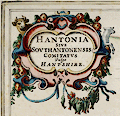
 Map Group GAY 1715
Map Group GAY 1715




from London; through Staines, Middlesex; Bagshot, Surrey; Hartley Row, Sutton Scotney, Stockbridge, Hampshire; Salisbury, Wiltshire; Blandford, Dorchester, Bridport, Dorset; Axminster, Honiton, to Exeter, Devon.
While you, my Lord, bid stately piles ascend,
Or in your Chiswick bow'rs enjoy your friend;
Where Pope unloads the boughs within his reach,
Of purplle vine, blue plumb, and blushing peach;
I journey far - You knew fat Bards might tire,
And, mounted, sent me forth your trusty Squire.
'Twas on the day that city dames repair
To take their weekly dose of Hide-Park air;
When forth we trot; no carts the road infest,
For still on Sundays country horses rest.
... ... ...
... ... ...
Prepar'd for war, now Bagshot Heath we cross,
Where broken gamesters oft' repair their loss.
At Hartley-Row the foaming bit we prest,
While the fat landlord welcom'd ev'ry guest.
Supper was ended, healths the glasses crown'd,
Our host extoll'd his wine at ev'ry round,
Relates the Justices late meeting there,
How many bottles drank, and what their cheer;
What lords had been his guests in days of yore,
And prais'd their wisdom much, their drinking more.
Let travellers the morning vigils keep:
The morning rose; but we lay fast asleep.
Twelve tedious miles we bore the sultry sun,
And Popham-Lane was scarce in sight by one:
The straggling village harbour'd thieves of old,
'Twas here the stage-coach'd lass resign'd her gold;
That gold which had in London purchs'd gowns,
And sent her home a Belle to country towns.
But robbers haunt no more the neighbouring wood:
Here unown'd infants find their daily food;
For should the maiden mother nurse her son,
'Twould spoil her match when her good name is gone.
Our jolly hostess nineteen children bore,
Nor fail'd her breast to suckle nineteen more.
Be just, ye Prudes, wipe off the long arrear;
Be virgins still in town, but mothers here.
Sutton we pass, and leave her spacious down,
And with the setting sun reach Stockbridge town.
O'er our parch'd tongue the rich metheglin glides,
And the red dainty trout our knife divides.
Sad melancholy ev'ry visage wears;
What, no Election come in seven long years!
Of all our race of Mayors, shall Snow alone
Be by Sir Richard's dedication known?
Our streets no more with tides of ale shall float,
Nor coblers feats three years upon one vote.
Next morn, twelve miles led o'er th' unbounded plain,
Where the cloak'd shepherd guides his fleecy train.
No leafy bow'rs a noonday shelter lend,
Nor from the chilly dews at night defend;
With woundrous art he counts his straggling flock,
And by the sun informs you what o'clock.
How are our shepherds fall'n from ancient days!
No Amaryllis chaunts alternate lays;
From her no list'ning ecchos learn to sing,
Nor with his reed the jocund valleys ring.
Here sheep the pastures hide, there harvests bend,
See Sarum's steeple o'er yon hill ascend;
... ... ...


Johnson, Charles & Whitehead, C: 1883: Lives and Exploits of English Highwaymen, Pirates, and Robbers: (London)
JOHN GAY
Harvey, Paul, Sir (ed): 1967 (4th edn): Oxford Companion to English Literature: Oxford University Press

